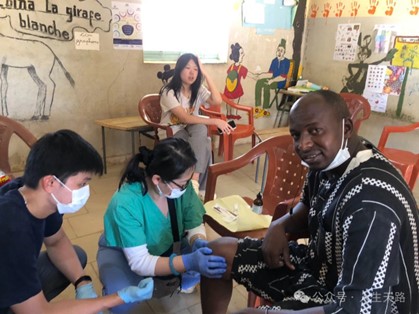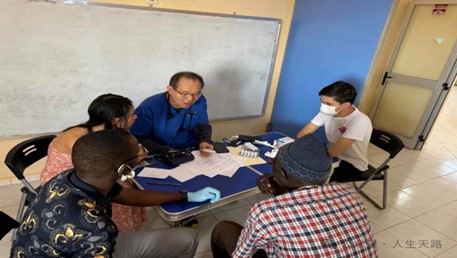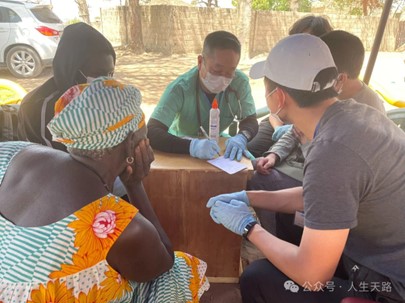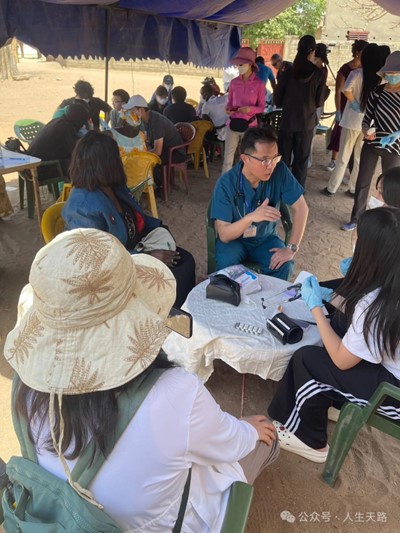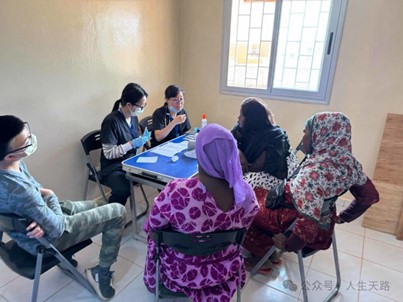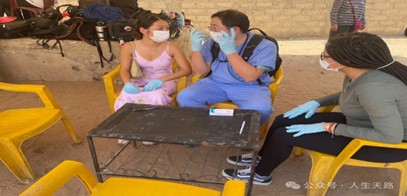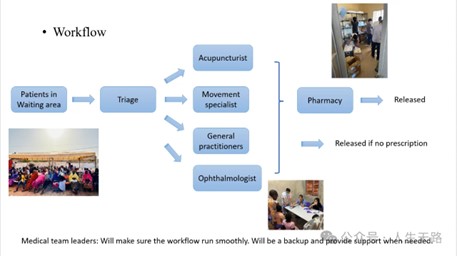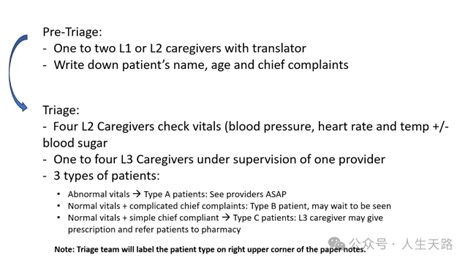First encounter with theory:
Surrounded by a group of youth, a male volunteer doctor writes “SOAP” on the white board:
S is Subjective – the subjective description of the patient or what the patient tells you
O is Objective – the objective examination of the doctor, or what you see in the patient
A is Assessment – the diagnosis
P is Plan – the treatment plan, or how you will manage the patient
On the first day that Dr Chris Liu arrived at the ACO base in Senegal, he expertly taught the key points of SOAP medical record, while other doctors added some more explanation. The youth under training understood well, maintained a strong interest in learning, and couldn’t wait to apply their new knowledge.
Applying the theory:
Our team greeted a big group of patients who came to our base by word of mouth the next day, which gives our youth team a great opportunity to apply what they learned.
We put the youth on the frontline of the free medical clinic. Under the guidance of doctors, they learned to obtain vital signs, take patients’ complaints about their condition, and bring the patients to the appropriate specialist doctor based on their respective situation.
In this process, the youth team are like professional nurses. They take the patient’s blood pressure, body temperature, heart rate, respiratory rate, and clearly understand the “S” or subjective part of the “SOAP” medical record. This “subjective” is so simple, a youth couldn’t help saying.
Despite the harsh working conditions on the site, doctors professionally guided the youth team to develop a sense of responsibility and pride. By thoroughly questioning and examining the patients, they were able to get enough information from them, and the youth team was able to experience and fully understand what the “objective” part of SOAP means.
“Assessment” is the diagnosis, or the determination of what condition or illness a patient has, based on the subjective and objective findings that were gathered.
After learning how to take subjective and objective information, and learning how to assess and make differential diagnoses, the youth now have to make an appropriate plan by recommending medicines and deciding the appropriate steps to take. This takes them to the “P” part of the SOAP – the plan.
 Dr. Hong Xu is showing the youth how to do a knee injection, strictly adhering to the procedure.
Dr. Hong Xu is showing the youth how to do a knee injection, strictly adhering to the procedure.
HOPE
We rotated the youth in different assignments and doctors to give them the chance to work in different areas of specialties. This gives each one of them an opportunity to gain wider knowledge, and to see for themselves the work ethics of each doctor. Hopefully, these experiences will cultivate in their young hearts a desire to serve patients with kindness and compassion.
We hope to cultivate a seed of love and aspiration in their hearts, so we have future generations to carry the torch in the medical field.
Our first batch of volunteers has returned to China after successfully finishing their first week of free clinic work. During flight, Dr Qiaoxin Yang asked the youth in the 5-6 age group about their feelings. The kids and their parents expressed mixed feelings, most of them saying they would come back next year.
Dr Chris Liu made the following working flow chart of the free clinic:
During our first week of free clinic, we coordinated 2 to 4 Level-3 youth volunteers according to age and capacity, to obtain vital signs and carry out triage. We believe that because a portion of the patients have simple conditions, they don’t need to see a doctor. The reality turned out to be what we expected: at least 1/3 of patients simply needed over the counter pain and/or fever, anti-diarrhea, anti-allergy, and anti-fever medications.
Thanks to the youth team’s contribution in the preliminary procedures (vital sign and triage), our work flowed smoothly, increasing our operation efficiency and decreasing resource waste of the medical team. Meanwhile, the youth learned diagnosis and making treatment plan in the real setting. Many youths learned how to give out medicine and explain to patients how to use it.
——————————————————————
If you feel moved to support our ministry in Africa, please contact us:
Jun Xu’s WeChat: jun9174343767
Email: Africacriesout@gmail.com
Public WeChat account: LifeExploring (人生天路)
Website: https://africacriesout.net
Editors in charge: Cao Juanjuan, Zhang Kun
Translator: Zhi Hua Duan
English editor: Xi Wang
Editor: Doris Cruz











